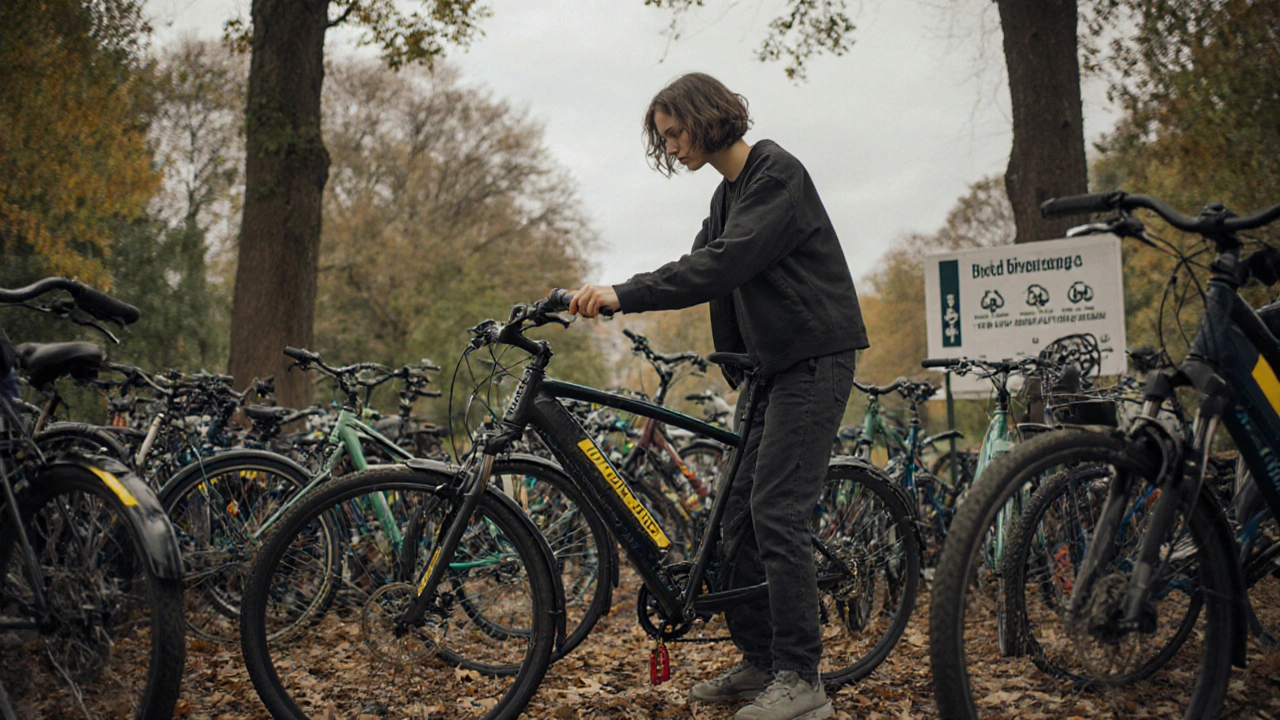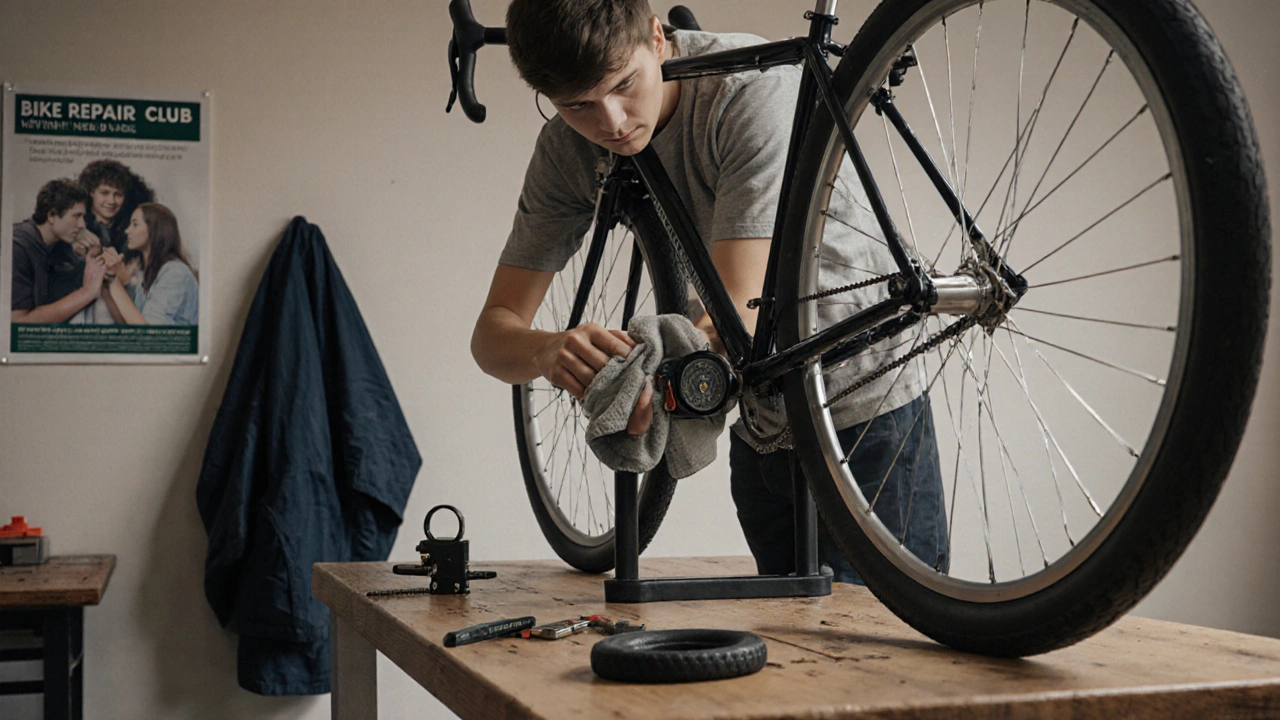
If you’re starting uni in the UK, you’ve probably heard the same advice: get a bike. It’s cheap, fast, and beats waiting for buses that never come on time. But buying a bike isn’t just about picking the cheapest one on Amazon. Locking it right? That’s where most students lose their ride. And maintenance? Most think it’s something you do once a year-until your chain snaps halfway to lecture.
What Kind of Bike Do You Actually Need?
You don’t need a carbon-fiber racing machine. You need something that survives rain, theft, and student neglect. Most UK campuses are flat, so a hybrid or city bike is perfect. Look for models with upright handlebars, wider tires, and fenders. Brands like Raleigh, Brompton, and Cube make reliable student bikes. Avoid cheap department store bikes-they break in weeks. A decent used bike from a local shop or university bike sale will cost £150-£300 and last you three years.
Check the brakes. Squeeze the levers. They should stop the wheel firmly without feeling spongy. Look at the tires. Are they cracked or worn down to the threads? That’s a red flag. Test the gears. Shift through all of them. If it skips or grinds, walk away. A bike with a single gear is fine if you live on flat ground, but most UK towns have hills. Go for 7-8 speeds. You’ll thank yourself when climbing out of campus.
Where to Buy: Avoiding the Student Trap
University bike fairs are tempting. You get a cheap bike, a free helmet, and a sense of accomplishment. But many of these bikes are donated junk-old frames with rusted chains and broken derailleurs. They’re sold as ‘student specials’ but often cost more to fix than they’re worth.
Instead, check Facebook Marketplace, Gumtree, or your university’s student union bike recycling program. Many universities, like UCL and Manchester, run repair-and-resell schemes where students fix up old bikes and sell them for under £100. These bikes come with a basic safety check and often include a lock. You can also find good deals at local independent bike shops. They’ll give you a 30-day warranty and show you how to fix a flat tire. That’s worth more than the £20 you save buying online.
Don’t buy a bike without a lock. Seriously. Even if the seller says, “It came with one,” test it. A cheap cable lock is useless. A U-lock made of hardened steel is the only thing that stops determined thieves. Make sure the seller includes one-or budget £30-£50 for a good one.
Locking Your Bike Right-So It Doesn’t Get Stolen
Over 70,000 bikes are stolen in the UK every year. Most of them are students’. And the number one mistake? Locking only the wheel.
Here’s how to lock your bike properly:
- Use a U-lock, not a cable. Look for one rated Sold Secure Gold or Diamond.
- Lock the frame and rear wheel to a fixed object-like a bike rack, not a tree or signpost.
- Remove the front wheel and bring it inside with you. Or lock it separately with a secondary cable.
- Don’t lock to flimsy racks. If it wobbles, it’s not secure.
- Always lock in a busy, well-lit area. Thieves avoid cameras and foot traffic.
Some students think a lock is enough. It’s not. Register your bike with BikeRegister (free). It’s the UK’s official bike database. If your bike gets stolen and found, police can trace it back to you. You’ll also get a unique QR code to stick on your frame. Thieves hate it.

Basic Maintenance: Keep It Rolling Without Spending a Penny
You don’t need to be a mechanic. But if your bike squeaks, skips, or won’t shift, you’re wasting time and energy.
Every month, do this:
- Check tire pressure. Look for the PSI range on the side of the tire. Inflate to the middle of that range-usually 40-60 PSI. Under-inflated tires wear out fast and make pedaling harder.
- Wipe the chain with a rag. If it’s gritty, drop a drop of bike-specific lubricant on each link. Wipe off the excess. Don’t use WD-40. It washes off too fast.
- Test your brakes. Squeeze the levers. If they touch the handlebar before stopping the wheel, tighten the cable or get them checked.
- Spin the wheels. If they wobble side to side, the rim is bent. That’s not an emergency, but it’s a sign you need a tune-up soon.
Every six months, take it to a local shop for a full check-up. It costs £20-£30 and includes brake adjustment, gear tuning, and bearing checks. That’s cheaper than replacing a broken hub or cracked frame.
Weatherproofing Your Ride
UK weather doesn’t care if you’re late for class. Rain, wind, and mud will ruin your bike if you ignore it.
Install fenders. They keep mud off your clothes and your chain. A £15 set from Decathlon lasts years. Use a chain guard if you can-it stops your trousers from getting greasy. If you ride in winter, switch to puncture-resistant tires. They’re thicker and slower, but you won’t get stuck with a flat every other week.
Store your bike indoors if you can. Even a shared hallway or bike shed is better than leaving it outside. Moisture kills chains and rusts bolts. If you must leave it out, cover it with a waterproof tarp. Don’t use a plastic bag-it traps moisture and makes things worse.

What to Do When Things Go Wrong
You’re cycling to campus. The chain falls off. Or the brake cable snaps. Or your tire goes flat.
Here’s what to carry:
- A mini pump or CO2 inflator
- Two spare inner tubes
- A multi-tool with a chain breaker
- Two tire levers
- Some cash or a contactless payment card
Most campuses have free bike repair stations. Look for wall-mounted pumps and basic tools. If you’re stuck, ask at the student union. Many universities have student-run bike repair clubs. They fix bikes for free or cheap. At Edinburgh, the Bike Collective offers drop-in hours every Wednesday. At Nottingham, students can borrow tools from the library.
If you’re not confident fixing it yourself, don’t force it. Walk the bike to the nearest shop. Most are used to students showing up with broken bikes. They’ll give you a quote and fix it while you wait.
Why This Matters More Than You Think
It’s not just about saving money on bus tickets. Cycling cuts your commute time in half. You’re not stuck waiting for a bus that’s 20 minutes late. You’re not sweating on a packed train. You’re outside, moving, breathing. Studies show students who cycle to uni have lower stress levels and better sleep.
And when you take care of your bike, you’re not just protecting your investment-you’re building a habit. Responsibility. Planning ahead. Fixing things instead of replacing them. Those skills don’t show up on a transcript, but they matter more than any grade.
Is it worth buying a new bike as a student in the UK?
No, not unless you have the budget. A well-maintained second-hand bike from a university program or local shop will serve you better than a cheap new one. Most student bikes last 3-5 years with basic care. Spending £300 on a used bike is smarter than spending £500 on a new one that gets stolen or breaks.
Can I use any lock for my bike?
No. Cable locks are easy to cut with bolt cutters. Always use a U-lock made of hardened steel. Look for Sold Secure Gold or Diamond ratings. These are tested against professional thieves. A good U-lock costs £30-£50 but is the only thing that actually works.
How often should I service my bike?
Do a quick check every month: tires, chain, brakes. Take it to a shop every six months for a full tune-up. If you ride daily in rain or mud, bring it in every three months. A £25 tune-up prevents a £150 repair later.
What if my bike gets stolen?
Report it to the police immediately. Give them the frame number and your BikeRegister ID. If you registered your bike, chances of recovery jump from under 5% to over 40%. Also, check local listings and campus noticeboards. Many stolen bikes turn up on Facebook Marketplace or in student halls.
Do I need lights and a bell?
Yes. UK law requires a white front light and red rear light when riding after dark. You also need a bell or horn. Most universities require it too. Buy a rechargeable set-they’re brighter and last longer than battery ones. A bell is cheap and helps avoid collisions on crowded paths.
Next Steps: Start Smart, Ride Longer
Don’t wait until your bike breaks. Get a lock. Register it. Learn how to fix a flat. Ride it every day-even if it’s just to the library. The more you ride, the more you’ll notice when something’s off. That’s how you keep it alive.
And when you do, you’re not just saving money. You’re joining a community. Students who bike talk to each other. They share tools. They fix each other’s bikes. They know where the best routes are. You’ll find your people-and your ride will be the reason you get there.